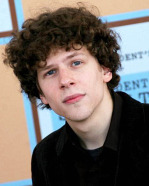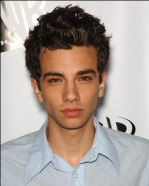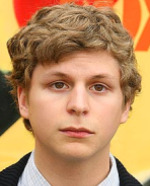A web journalist interviewed me last week about the way Jesse Eisenberg, whose latest film is Holy Rollers, seems to play the same guy all the time. That led me to conclude that this isn’t just true for Eisenberg but also Michael Cera and Jay Baruchel. They’re the leading lights of this spindly-Jewish aesthetic, I think — the smart-sensitive nerd triumvirate of 21st Century cinema.



(l. to r.) Jesse Eisenberg, Jay Baruchel, Michael Cera
They tend to play the same kind of thin, hesitant, cerebral types. Always susceptible to romantic delirium at the drop of a hat. Always with a girl who’s a little bit (or a whole lot) hotter than they deserve to be with, or could hope to be with in real life. They could easily step into each other’s roles. Same manner, similar neck size, height and weight, similar phrasings and dress styles.
They’ve all been deballed and almost girlified down, these guys. The culture has told them “this is how we need you to be.” Or rather girls have said this — girls who prefer soft and open and sincere to “manly,” whatever that amounts to these days. For most under-30 women, I suspect, old-school manly means not being emotionally reachable or accomodating — crusty, a touch of the hard-boiled, strong but lacking empathy.
If a 1963 incarnation of Steve McQueen was to return to earth, he wouldn’t have much luck with Kristen Stewart, I bet. She’d probably roll her eyes and chuckle and mutter “hah…whoa…a little too distant and hung up on himself.” (Megan Fox might fuck him though.)
However much men might talk about their admiration for McQueen and leaf through coffee-table books of his black-and-white photographs, they know his routine is more or less outmoded. Entombed even. Ditto the Robert Redford, Warren Beatty, Bruce Willis, Sean Connery, Clint Eastwood and Paul Newman models. All gone from the landscape, except as an opportunity for a spoof or satire of some kind.
Which is how Willis’s John McClane was played in Live Free or Die Hard. As a hide-bound geezer, clinging to the macho code for dear life. Justin Long, whose persona isn’t quite as distinct as Eisenberg-Cera-Baruchel and therefore hasn’t caught on in the same way, played an approximation of today’s male — bright and alert and courageous as far as it goes, but divorced from the mentality and the culture that produced McLane types in the mid to late 20th Century, and using his Obama-generation attitude to poke at Willis’s pretension.
The Expendables is being marketed, I think, in a semi-satirical vein. As a hyper-violent old-school goof. That was how Stallone’s last Rambo film was processed, or so it seemed when I saw it in Santa Barbara a couple of years ago.
The young Dustin Hoffman would fit right in with Eisenberg and those guys, I suppose. I think that’s why Hoffman took the David Sumner role in Sam Peckinpah‘s Straw Dogs — to show that he had more going on than just that smart, sensitive, internalized short-guy thing, to show he had the stuff to beat a guy to death with a golf club and feel good about it afterwards.
Could Eisenberg, Barchel or Cera have sold this quality in Rod Lurie‘s Straw Dogs remake, if Lurie had chosen to precisely duplicate Hoffman’s mathematician character? (Which he hasn’t, by the way.) I seriously doubt it.
I asked Jett about the Dweeb Pack, and he said they’re analagous to the anti-machismo, no-power-chords strain in today’s indie rock, which is about as far away from basic Lou Reed guitar, bass and drums rock as you can get. I realize (having been instructed by HE readers) that plenty of indie rockers play solid-beat, live-percussion, jangly-twangy rock, but the stuff I’ve heard on my sons’ iPhones seems so cut off from 20th Century blues-rock traditions — girlish, aerie-fairie, kind of whoo-hoo-heeyo — that it makes me wince at times.
